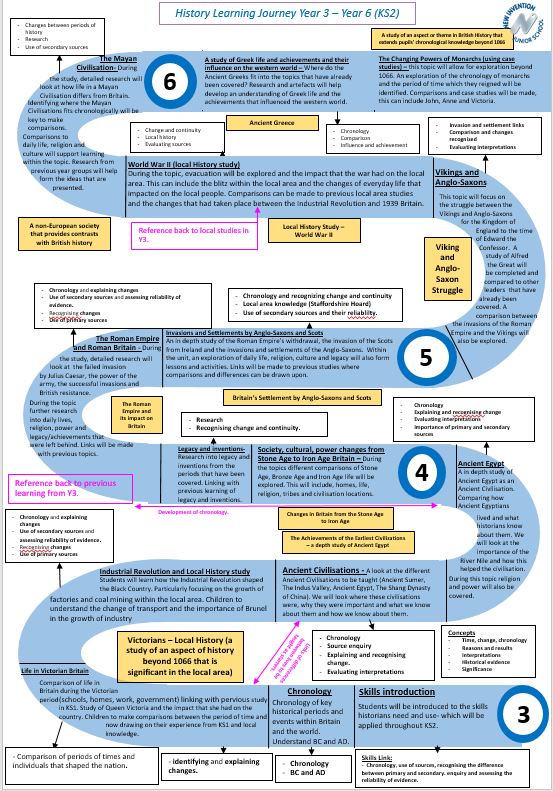History
Intent
'Inspire pupils' curiosity to know more about the past.'
To truly understand the world we live in, we need to understand our past - locally, nationally and globally. Through offering breadth and depth in our curriculum, we want to equip our children with key historical knowledge so that they can become confident, passionate and inquisitive historians who can discuss concepts, debate and reason the significance of historical events and make sense of the modern society they live in.
Implementation
Each unit of work should not be viewed as a stand-alone topic, but as a chapter in the story of the history of Britain and the wider world. Understanding in history requires an understanding of causation. Children will be able to understand the causes of significant national and global events, (such as World War II), when they have some background knowledge of what happened before.
Knowledge of substantive concepts and disciplinary concepts have been interleaved across the curriculum, allowing children to encounter and apply these in different contexts. From year to year, unit to unit, lesson to lesson, the curriculum supports children in making connections and building upon prior substantive and disciplinary knowledge.
The history curriculum is balanced to enable children to look in some depth at local, national and world history, encouraging children to explore the connection between significant events and people and how they have influenced the modern world. The content in the curriculum ensures children have a secure overview of a period, before studying aspects in more depth. While many of the units last over one term, some units are longer, ensuring children secure the complexities of the content and have more time to study the period in more detail.
The curriculum aims to help children understand how the past is constructed and contested. Children begin by learning about what a historian does, looking at basic sources and simplified perspectives to develop an appreciation and understanding of what it means to be a historian. As their substantive knowledge grows, children will be able to ask perceptive questions, analyse more complex sources and begin to use their knowledge to develop perspective. Disciplinary concepts, such as continuity and change, cause and consequence and similarity, difference and significance, are explored in every unit, and children are supported to think outside of their current unit of work and apply these concepts across the curriculum.
The curriculum aims to ignite children’s love for history, preparing them with essential knowledge for Key Stage 3 and beyond.
Impact
Our History Curriculum aspires to create curious and knowledgeable young people, who have a deep understanding and appreciation of history, and are able to look at different evidence to begin to formulate their own viewpoints and perspectives of the world. Children begin to ask effective enquiry questions and continue to question events of the past. When our children leave us, as well as being ready for the KS3 curriculum, they will have a wealth of transferable skills which they have developed over their time at New Invention Junior School.
'Equip pupils to ask perspective questions, think critically, weigh evidence, sift arguments, and develop perspective and judgement.'
Supporting SEND in History
Children are encouraged to attempt to work independently to research different eras and historical figures to develop a deeper understanding. We ensure that we vary our teaching styles to suit the children in the class through visual aids, hands on learning, auditory clips as well as discussion and simplification of language where needed. Throughout our school, we ensure that children are given the opportunity to explore history within the local area, the British Isles and that of the wider world. Within the subject, we have a wide range of resources to support the learning both inside and outside of the classroom environment. Within our school, we have a wide range of artefacts linked to all of the topics that we study, which enable the children to have a ‘hands on’ approach and explore the items in a different way. Within the classroom setting, teachers and support staff are vital within history lessons and work closely with the class to ensure that the children are being given the best chance possible to develop their historical knowledge and give views and opinions on the different periods of history. Children have the opportunity to use different aids to record their historical findings, whether this be through videos, Seesaw, photographs or group activities.
Learning Journey
Historical Events
Over the course of the year, we celebrate many historical events. Below are the events we have covered so far this academic year.
October 2024 - Black History Month
Throughout October, children will be studying significant individuals who have changed history. This year, the children have had the opportunity to look at the lives of many different influential black people during the month of October.
November 2024 - Remembrance Day
During November, children have been learning about Remembrance Day and the impact that this period of history has had on the UK. Each year group has explored this period of history in different ways, including through art, poetry and the use of artefacts. This year, many year groups based their learning through using the book 'Finding Alfie' by Michael Morpurgo.

